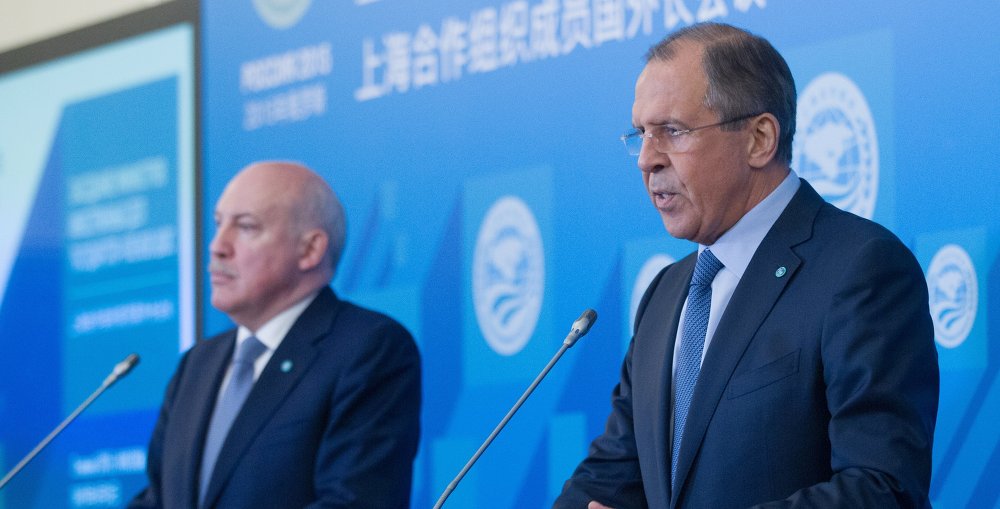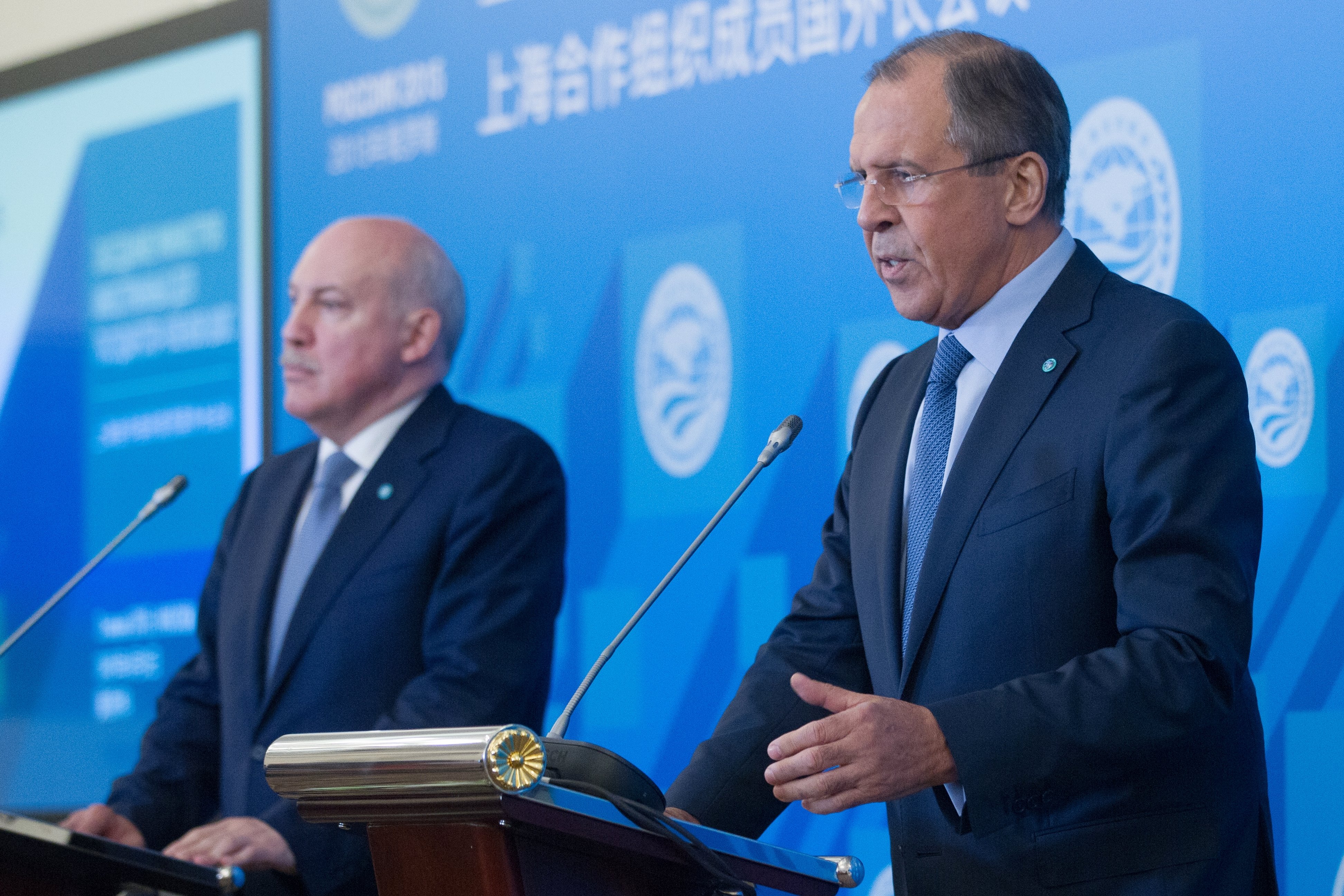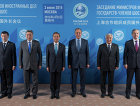
Briefing by Russian Minister of Foreign Affairs Sergei Lavrov and SCO Secretary-General Dmitry Mezentsev following an SCO Council of Ministers of Foreign Affairs Meeting

Sergei Lavrov: Good evening, ladies and gentlemen.
Our meeting today has opened a critically important stage in Russia's SCO Presidency - preparations for the upcoming Summit of the Shanghai Cooperation Organisation in Ufa on July 9-10 this year.
Our meeting began with a visit to the Kremlin, where the foreign ministers and the heads of the permanent SCO agencies met with President Vladimir Putin. The President outlined our priorities for the current stage, when we must work to ensure the success of the Ufa Summit.
During the SCO Council of Ministers of Foreign Affairs Meeting held after the visit to the Kremlin, we discussed the basic drafts of the final documents that will be submitted for approval at the Ufa Summit. The most important of them is the SCO Development Strategy Towards 2025, which is a comprehensive document that bears upon all aspects of our cooperation. Another important document is devoted to the 70th anniversary of Victory in World War II. We will forward a draft of this document to the heads of state.
Of great importance for building up cooperation of the SCO member states, considering the threats in the region and around it, will be a document which we discussed today as a draft, the SCO programme of cooperation in combating terrorism, separatism and extremism for 2016-2018. We have also approved a draft statement on the drug threat, which will be submitted to the heads of state for approval.
We are also working on several other documents such as an agreement on SCO cooperation on border issues.
In addition to discussing the drafts of the summit's final documents, we exchanged opinions on the situation in the SCO region of responsibility, first of all in view of the current complicated situation in Afghanistan, which has not eased but has become even more complicated and is conducive, unfortunately, to the growth of the terrorist and drug threats that can directly affect the stability and security of the SCO member states. As I have said, the proposals we are formulating for approval at the summit are designed to increase the effectiveness of efforts to combat these threats.
We also discussed a related issue of the terrorist threat in the Middle East and North Africa and the situation in Syria, Yemen, Iraq and Libya. We agree that in all of these cases we need to ensure an exclusively peaceful settlement through political and diplomatic efforts. This approach is valid for all other crises, including Ukraine, where we must ensure the launch of an internal dialogue between Kiev, Donetsk and Lugansk. We discussed this today, too.
We have formulated several recommendations. We hope they will be approved by the heads of our states. If they adopt corresponding decisions at the Ufa Summit, this will launch the process of the SCO expansion, first of all through starting the accession process for India and Pakistan.
We also discussed Iran's application, which has been actively involved in the SCO activity as an observer state since 2005. All of us have spoken in favour of enhancing Iran's status in the organisation in view of a comprehensive settlement of Iran's nuclear problem.
I can say that we worked actively as a team, and we are not saying good-bye because tomorrow we will meet at a special conference of the foreign ministers on regional security, which will be attended by representatives of the SCO member states, observer states and dialogue partners.
In conclusion, I'd like to thank SCO Secretary-General Dmitry Mezentsev and Executive Committee Director of the SCO Regional Anti-Terrorist Structure Zhang Xinfeng for invaluable contribution to preparing our meeting today and other meetings of various SCO member states' agencies, which are contributing to the success of the upcoming Ufa Summit.
Thank you.
Dmitry Mezentsev: Colleagues - I can address you like this because I have worked in the media - I'd like to point out that the Council of Ministers of Foreign Affairs has special importance for the SCO. As Mr Lavrov said, today we discussed a wide range of issues pertaining to preparations for the Ufa Summit. We will submit a large block of documents that are vitally important for the SCO to the heads of the organisation's states.
I'd like to say that this meeting has reaffirmed the friendly nature of relations between the foreign ministers, and that we have provided clear and accurate assessments of our cooperation, the situation in the region and current issues on the international agenda. They are important to absolutely all sides without exception, and they will be taken into account at the SCO headquarters and at the Regional Anti-Terrorist Structure.
The list of documents which Mr Lavrov mentioned gives us confidence that the Ufa Summit will become a signal event.
It is imperative that I say the following. The programme of Russia's SCO Presidency includes over a hundred issues. Russia has not abandoned or postponed a single one of them. Conferences, seminars, round tables and serious, fundamental departmental meetings - all of them have been held as planned. In this sense, all the principles of Russia's Presidency, which Vladimir Putin outlined at the SCO Summit in Dushanbe, have been implemented without fail. Russia's term as the presiding country has also reaffirmed the principles of continuity and support for the projects launched during the previous term, in this case, during Tajikistan's Presidency. I believe that this attitude will not be abandoned. Mr Lavrov, I'd like to thank you for speaking about the meeting's achievements and to say that your assessment has shown that the sides, the foreign ministry teams and the representatives of other ministries and departments, as well as the permanent SCO agencies, worked in a very friendly and constructive atmosphere.
Thank you.
Question: Mr Lavrov, this is a question about Iran. Talks on [Iran's] nuclear programme have entered the home stretch. To what extent, in your opinion, will the positive or negative outcome of these talks influence Iran's status in the SCO and what are the impediments to a treaty?
Sergei Lavrov: There are no impediments to the successful completion of the talks on Iran's nuclear programme if only all parties to the talks stay within the political framework coordinated at a foreign ministers' meeting in Lausanne, which opens a way to dealing with all aspects of this issue without exception. I don't want to jump ahead of events. So far everyone is focused on results - moreover, results that could be achieved within the set timeframe, specifically by the end of June.
You know, in the final stages of negotiations on various issues one party or another is tempted to bargain for more at the very last moment and this can complicate the situation somewhat. So far, I hope, we are all moving in the right direction. Our deputies, political directors of the P5+1 and Iran are working in Vienna today. Tomorrow, the conference that I have mentioned will be attended by Iranian Foreign Minister Zarif (Mohammad Javad Zarif). We will certainly share our opinions on the situation at the talks. Progress is well in evidence. It is not final yet but, to reiterate, we are moving in the right direction. And as I said earlier, the prevailing opinion in the course of today's discussion was that we all want to upgrade Iran's status at the Shanghai Cooperation Organisation and this can be done in the context of a comprehensive settlement of Iran's nuclear problem.
Question: A question for Mr Lavrov. There are reports that the situation in the Ukrainian conflict zone is worsening. In particular, the Ukrainian Armed Forces say the self-defence forces have mounted a large-scale offensive near Maryinka. There are reports of casualties. In this context, will there be a contact group or Normandy format meeting? Is this a case of bilateral derailment of the Minsk Agreements? Thank you.
Sergei Lavrov: I do not want to think that someone is out to thwart the Minsk Agreements although at times it seemed that there are plenty of those in Kiev who would like to do just that. This is evident, among other things, from the attitude to Kiev's commitments on the amnesty, the constitutional reform and the holding of elections subject to approval with Donetsk and Lugansk. But of course, the escalation of the military situation along the line of contact is the most pressing issue. I do not have precise information. We have local representatives at the joint coordination and control centre, which, let me remind you, includes Russian and Ukrainian officers and was formed at President Poroshenko's personal request in order to objectively assess the situation and help the UN Special Monitoring Mission to see who violates the ceasefire and the agreement on the withdrawal of heavy weapons. I would like to add that we have long taken note of the fact that, judging from reports coming from what is now the battlefield, from the areas along the line of contact on both sides, there is massive destruction of civilian infrastructure, hospitals, schools, kindergartens and residential buildings in the areas controlled by the self-defence forces only. For some reason, civilians are being killed only on that side of the line. Military personnel losses are reported only on the Ukrainian government's side. To understand what is going on we asked the OSCE to task the Special Monitoring Mission to report not only on who shelled what or how many times, but also the targets of those attacks, as well as who is affected as a result - civilians or military units shelling residential areas. I am sure that this is a very simple task, which the Special Monitoring Mission should fulfill to give everyone a full picture of what is actually going on and who is violating not only the Minsk Agreements but also the rules of international humanitarian law by shelling residential areas with enviable regularity.
To reiterate, the Joint Centre for Coordination and Control and the OSCE Special Monitoring Mission are designed to stop all this. We are ready to meet in any format to urge the sides to honour the agreements, but there are all the required mechanisms in place on the ground. They should simply be tapped to the full, not ignored or questioned as to their viability.
However, the most important thing is to see the overall picture and bear in mind that those who are trying to escalate the military situation along the line of contact (whoever they are), wittingly or unwittingly, are stymying progress on all other key aspects of the Minsk Agreements, primarily political, economic and humanitarian provisions. Because while people are busy fighting, there is a pretext for not carrying out political reforms. I wish I was wrong, but this is the impression we have and it is difficult to dismiss.
Nevertheless, I would like to close on a positive note. Yesterday's meetings of working subgroups, which took place in Minsk, failed to produce conclusive results on any issue under discussion, but there is progress, including on the demilitarisation of Shirokino and the inclusion of artillery systems and mortars below 100 mm on the list of weapons subject to withdrawal; there is some progress on a number of other areas, including the start (at last!) of direct consultations between Kiev, Donetsk and Lugansk on preparations for local elections. I will not jump ahead of events. There are some positive indications. It is important now that everything that has been agreed upon is put into practice. To this end, new meetings of corresponding subgroups have been scheduled. And it is very important that no one disrupts this emerging, fragile progress with such recurrences of military activity.
Thank you.
